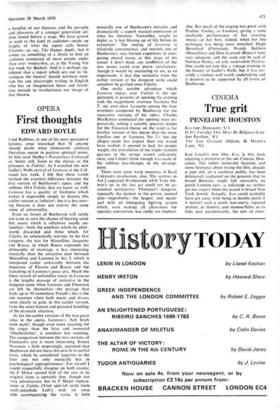OPERA
First thoughts
EDWARD BOYLE
Lord Robbins, in one of his most perceptive lectures, once remarked that 'If anyone should doubt what [nineteenth century] liberalism meant in positive spiritual terms, let him read Shelley's Prometheus Unbound or, better still, listen to the chorus of the prisoners in Fidelio'. As I watched the new Sadler's Wells revival of Leonora at the Col- iseum last week, I felt that these words marked the essential difference between the first version of Beethoven's opera and the sublime 1814 Fidelio that we know so well. Leonora has a quality of freshness which makes it impossible simply to dismiss this earlier version as `inferior'; but it is less mov- ing because it does not convey the same sense of universality.
Even so, lovers of Beethoven will surely not want to miss the chance of hearing some fine music which is otherwise totally un- familiar—both the numbers which he after- wards discarded and those which, for Fidelio, he substantially rewrote. In the first category,• the trio for Marcellina, Jacquino and Rocco, in which Rocco expounds his philosophy of marriage, is less interesting musically than the attractive duet between Marcellina and Leonora in Act 2, which is interposed rather awkwardly between the departure of Pizarro and Rocco and the launching of Leonora's great aria. Much the finest stretch of unfamiliar music in Leonora is the lengthy passage of recitative in the dungeon scene when Leonora and Florestan are left by themselves—the passage -that leads up to '0 namenlose Freude'; this is the one moment when both music and drama seem clearly to gain, in this earlier version, from the more human and personal handling of the dramatic situation.
As for the earlier versions of the two great solos in the opera, Leonora's 'Ach brick noch nicht', though even more exacting for the singer than the later and immortal 'Abscheulicher', is somehow less stunning. The comparison between the two versions of Florestan's aria is more interesting. Ernest Newman, a little surprisingly, regretted that Beethoven did not leave this aria in its earlier form, which he considered 'superior to the later one not only musically but in psychological appropriateness'. For myself I would respectfully disagree on both counts; the F Minor second half of the aria in its original form is certainly fine, though not very adventurous, but its F Major replace- ment in Fidelio ('Und spiirIch nicht linde sanft-sailselnde Luft') with its oboe solo accompanying the voice, is both musically one of Beethoven's miracles and dramatically a superb musical expression of what his librettist, Treitschke, sought to depict as 'a last blazing up of life before its extinction'. The ending of Leonora is relatively conventional, and reminds one of Beethoven's very limited experience in com- posing choral music at this stage of his career. I don't think any conflation of the two scores could ever prove satisfactory, though it would be interesting to see, as an experiment, if that fine recitative from the earlier version of the dungeon scene could somehow be grafted onto Fidelio.
One really notable advantage which Leonora' enjoys over Fidelio is the op- portunity it presents of opening the evening with the magnificent overture 'Leonora No 2', my own clear favourite among the four overtures composed by Beethoven for the successive versions of his opera. Charles MacKerras conducted the opening most im- pressively, setting a suitably spacious tempo for the Florestan theme on the wind (a far lovelier version of this theme than the more familiar one in 'Leonora No 3), but the allegro made less impact than one would have wished; it seemed to lack the proper weight, the articulation of the triplet tremolo quavers in the strings wasn't sufficiently clear, and I didn't think enough was made of the sublime key-changes in the develop- ment.
There were some weak moments in Basil Coleman's production, also. The sentries in Act 2 appeared ill-rehearsed, while Tony Ab- bott's set in the last act could not be ac- counted satisfactory. Florestan's dungeon, reputedly the darkest in the prison, seemed also—improbably--the largest, and equip- ped with an emergency lighting system which, even making all allowances for operatic convention, was really too implaus- ible. But much of the singing was good. with Pauline Tinsley,' as Leonora, giving a most creditable performance of her exacting music—at her best, indeed, when her fine technique was being most stretched. Hugh Beresford (Florestan), Wendy Baldwin (Marcellina) and Don Garrard (Rocco) were very adequate, and the same can be said of Norman Bailey, an icily malevolent Pizarro. One could not rate this a vintage evening in the history of Sadler's Wells, but it was cer- tainly a venture well worth undertaking and it deserves to be supported by all lovers of Beethoven.


































 Previous page
Previous page